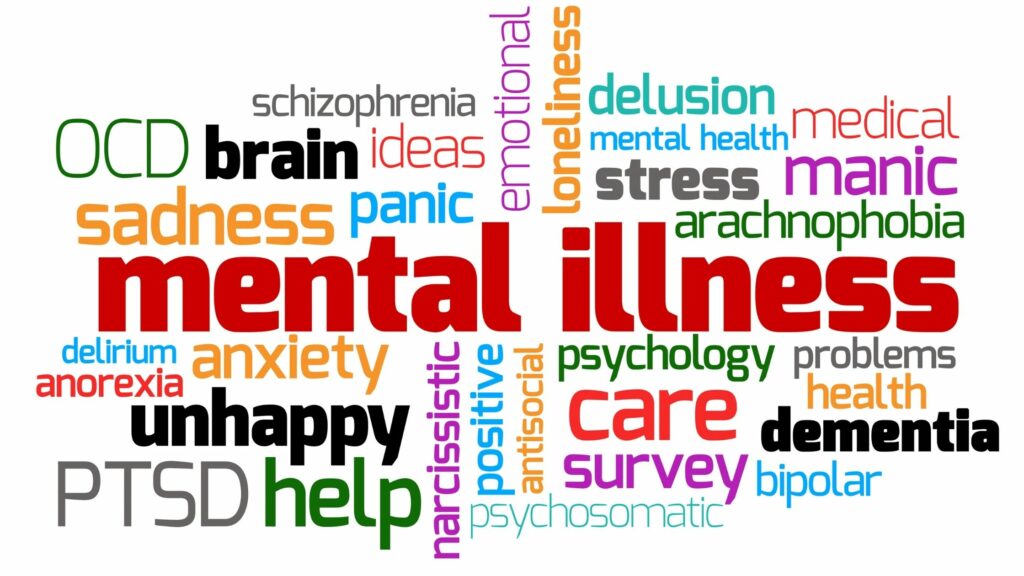Mental illness can be a difficult thing to deal with, both for the person who is suffering from it and for their loved ones. It is important to be able to spot the warning signs of mental illness so that you can get help for the person as soon as possible. In this blog post, we will discuss the most common warning signs of mental illness. We will also talk about what you should do if you think someone you know might be suffering from a mental illness.
Contents
What Does Mental Illness Mean?

In life, everyone experiences ups and downs. There are times when we feel great and other times when we feel down in the dumps. For most people, these feelings are temporary and will pass within a few days or weeks.
However, for those suffering from mental illness, these feelings can last much longer – months or even years – and can have a profound effect on their day-to-day lives.
Mental illness is a general term that covers a wide range of mental health conditions. So, these include conditions such as anxiety, depression, schizophrenia, eating disorders, and addiction.
It can affect anyone, at any age. It is important to remember that mental illness is not simply a case of “feeling down” – it is a serious medical condition that requires professional treatment.
Warning Signs And Symptoms of Mental Illness

Certain signs and symptoms may indicate the presence of a mental illness. Please keep in mind that these signs and symptoms can also be caused by other, non-mental health conditions. If you are concerned about yourself or a loved one, it is best to consult with a mental health professional to get an accurate diagnosis.
The following are some warning signs and symptoms of mental illness:
Excessive Sadness
Depression is a common mental illness that can cause feelings of sadness or low mood that last for weeks or longer. Other symptoms of depression may include changes in appetite, sleep patterns, fatigue, and energy levels.
Loss of Interest
When someone is going through a tough time, it’s normal for them to lose interest in activities they once enjoyed. However, when this loss of interest lasts for more than two weeks and is accompanied by other symptoms, it may be a sign of depression.
Withdrawl from Friends and Family Members
Do you find yourself withdrawing from social activities or distancing yourself from friends and family members? This could be a sign that you are struggling with depression, anxiety, or another mental health condition.
Changes in Eating or Sleeping Habits
Changes in appetite and sleep patterns are common among people with mental illness. These changes can be either an increase or decrease in appetite and may include sleeping more or less than usual.
Changes in Energy Levels
Feeling excessively tired or having little to no energy is a common symptom of mental illness. If you are struggling to get out of bed or complete basic tasks.
Unexplained Aches and Pains
Physical pain is a common symptom of mental illness, particularly conditions like anxiety and depression. This pain may manifest as headaches, stomachaches, or general aches and pains with no apparent cause.
Anxiety
Anxiety is a normal emotion that we all experience from time to time. However, when this feeling is constant or overwhelming, it may be a sign of an anxiety disorder. People with anxiety may also experience physical symptoms such as a racing heart, sweating, and difficulty breathing.
Mood swings
Do you find yourself feeling happy one minute and then angry or sad the next? If your mood swings are severe and interfere with your ability to function, they may be a sign of a mental health condition.
Delusions of Hallucinations
People with mental illness may sometimes experience delusions, which are false beliefs that they hold despite evidence to the contrary. Hallucinations are when someone sees, hears, or feels things that are not really there. If you or someone you know is experiencing these symptoms, it is important to seek help from a mental health professional.
If you or someone you know is experiencing any of the above symptoms, please reach out to a mental health professional for help. Early intervention can make a big difference in managing mental illness and preventing it from getting worse. With proper treatment, many people with mental illness are able to live happy and healthy lives.
Mental illness is nothing to be ashamed of. So, if you are experiencing any of the above symptoms, please reach out for help. There are many resources available to you, including hotlines, support groups, and therapy.
Remember that help is available and recovery is possible. If you suspect that someone you know may be struggling with mental illness, there are a few things you can do to support them.
Risk Factors that Can Increase Mental Illness

There are certain factors that can increase your risk of developing mental illness. These include:
- Having a family member with mental illness
- Going through a traumatic experience
- Having chronic medical conditions
- Taking certain medications
- Abusing drugs or alcohol
If you have any of these risk factors, it’s important to be aware of the warning signs of mental illness so you can get help if you need it.
Treatment of Mental Health

With time the treatment of mental health has improved a lot. If you or someone you know is facing mental illness, there are many options available for treatment. Early detection and intervention can make a big difference in managing mental health conditions.
There are different types of treatments available including medication, therapy, and self-care. So, it is important to find the right combination of treatments that work best for you or your loved one.
Most mental health treatments can be categorized into three different types:
- Somatic
- Psychotherapeutic
Somatic
This type of treatment focuses on the physical body and includes things like medication and electroconvulsive therapy. This therapy includes different types of drugs that can be used to treat mental illness.
This therapy includes treatments like:
- Drug therapy
- Electroconvulsive therapy
- Vagus nerve stimulation
- Deep brain stimulation
- Transcranial magnetic stimulation
Psychotherapy
This type of treatment focuses on changing thought patterns and behaviors. It can include individual therapy, group therapy, or family therapy.
Most of the studies say that psychotherapeutic treatment is more effective than somatic treatment, but the decision of what type of treatment to use should be made between a mental health professional and the patient.
There are six types of mental health psychotherapies:
- Behavioral Therapy: This therapy focuses on helping the patient change their behavior. It can use to treat conditions like phobias, anxiety disorders, and eating disorders.
- Cognitive Therapy: This therapy helps the patient change their thinking patterns. It can use to treat conditions like depression and anxiety disorders.
- Interpersonal Therapy: This therapy focuses on the relationships between people. It can use to treat conditions like depression and eating disorders.
- Psychoanalysis: This therapy focuses on the unconscious mind. It can use to treat conditions like depression and anxiety disorders.
- Psychodynamic Psychotherapy: This therapy focuses on the unconscious mind and early childhood experiences. It can use to treat conditions like depression and anxiety disorders.
- Supportive Psychotherapy: This therapy focuses on providing support to the patient. It can use to treat all types of mental illness.
Conclusion
In conclusion, mental illness is a real and serious problem. So, if you or someone you know is showing any of the warning signs, don’t hesitate to reach out for help. There are many resources available to get started on the road to recovery.
Mental illness is nothing to be ashamed of; it’s something that should treat like any other health condition. With the right support, people with mental illness can lead happy and fulfilling lives. Thanks for reading!
If this post resonated with you, please share it with others who might need to see it. And, you never know who might be struggling silently with their own mental health issues. So, let’s break the stigma together!
A Word From Therapy Mantra
Your mental health — Your psychological, emotional, and social well-being — has an impact on every aspect of your life. Positive mental health essentially allows you to effectively deal with life’s everyday challenges.
At TherapyMantra, we have a team of therapists who provide affordable online therapy to assist you with issues such as depression, anxiety, stress, workplace Issues, addiction, relationship, OCD, LGBTQ, and PTSD. You can book a free therapy or download our free Android or iOS app.


